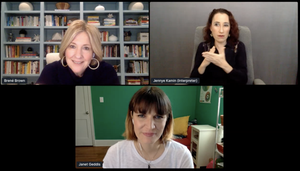 "What Now!?" was the apt title of Winter Institute 16's Saturday keynote, which featured Dr. Brené Brown, bestselling author (most recently Dare to Lead), podcaster and research professor, in conversation with Janet Geddis, owner of Avid Bookshop, Athens, Ga., on the complexities of leadership, formal and informal, during this most challenging time.
"What Now!?" was the apt title of Winter Institute 16's Saturday keynote, which featured Dr. Brené Brown, bestselling author (most recently Dare to Lead), podcaster and research professor, in conversation with Janet Geddis, owner of Avid Bookshop, Athens, Ga., on the complexities of leadership, formal and informal, during this most challenging time.
"I don't think I've been on a call in the last nine months with CEOs and C-Suite people where at least half the them were not in tears," Brown said. "So I think the most important thing we can do to start with is to normalize that everybody is in struggle, everyone's weary, everyone's anxious, everyone's having a very difficult time.... You're not alone. I think that's the big start. No one's got this figured out."
 She also observed that leaders "who went into the pandemic and the racial reckoning working from a very humanized perspective have done much better. Relational leaders are doing much better and their organizations are faring better than transactional leaders."
She also observed that leaders "who went into the pandemic and the racial reckoning working from a very humanized perspective have done much better. Relational leaders are doing much better and their organizations are faring better than transactional leaders."
One of the systems her organization has instituted is the "two-word check in." At every meeting the first thing they do is ask everyone to express, in two words, where they are today. "It's a way to say I see your humanity before I ask you to start working," Brown said.
Geddis agreed, noting that Avid Bookshop, which has been closed for browsing since last March, has "been meeting on Zoom as a staff and we do our mental health check-in at the start."
A challenge for businesses like Avid now is that "hard conversations are hard on Zoom," Brown said. "One of the fastest ways we build trust is we listen more than we talk. We ask what's getting in the way and we try to figure out our part in things. What are we doing that's undermining trust and safety in our teams? That's really where we have to start."
She uses the "rumble" technique as an intention setter "to indicate, hey, we need to have a conversation. It could be uncomfortable, but we're going to stay in it until we resolve it." Time awareness is also key: "I have never once in my career, nor have I spoken to anyone, who has ever regretted taking time in a hard conversation."
Geddis pointed out that when she was starting her business, she was often stymied by the problem of "why isn't everybody able to read my mind and just do all the things that I know are right to do. One thing that has been really surprising to me--and I've talked to other bookstore owners about it--is this factor of 'you made this.' For a lot of people who own bookstores, this is their dream. It's scary not only to let other people into it, but to then open your mind enough to start accepting their ideas, accepting some feedback that can be really tough to hear about how you might be as a manager or the way you're running things. It can be really hard."
Brown suggested owners ask themselves: "Do you only want this to be as good as what you can do alone?"
For the past decade, her organization has used a filtering tool called the Five Cs--color, context, connective tissue (how it connects to other initiatives or projects they're doing), cost, consequence--for evaluating questions and suggestions.
"One thing we're doing is we're slowing down and helping people understand the Five Cs of everything we ask them to do so that they can see the bigger picture," she noted. "So not only do people understand why they're doing it and feel more connected to the future and mission of what we're trying to do, but they can do it better.... I think sharing more detail with the people around us so they can be part of the visioning really changes engagement and investment levels and makes us better."
Regarding the future, Brown said, "I think there will not be a new normal, which is great because the pandemic revealed in the old normal cracks and fissures and inequity galore. I think we're going to live in constant disruption moving forward, and that will affect bookshops as well."
So what do we do? "Right now, the most important thing we have is each other--human beings, our teams, our people," she observed. "And it's very necessary as a leader to make sure people are seen." --Robert Gray

